Historical Society of
Pottawattamie County
County Seat Council Bluffs, Iowa
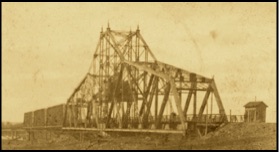

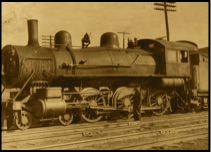
Council Bluffs' Unit K-
More Than Three Decades Before MASH a Council Bluffs Mayor Created the World's First Mobile Battlefield Hospital
World War I was a global conflict centered in Europe that drew in all the world's great economic powers.
The immediate trigger was the assasination of Archduke Ferdinand June 28, 1914. Alliances formed over past decades were involved and within a few weeks the major powers were at war.
Traditionally, soldiers wounded in battle needed to be carried on stretchers to carts, wagons and later motorized ambulances to hospitals set up behind the lines. Increased industrial and technological sophistication, such as machine guns and explosive bullets, led to an unprecidented number of casualties in World War I. The well manured farm fields of France were laden with bacteria, making infections a real problem. Time spent in moving the wounded reduced chances of survival, as did the trauma inflicted by the transportation itself.
France had the idea of a mobile hospital but had not put it into action. The first mobile medical hospital to be active was Unit K, also referred to as Mobile Hospital #1 or simply "The Council Bluffs Unit."
Council Bluffs physician and former mayor Dr. Donald Macrae, Jr. created Unit K by enlisting twelve southwest Iowa doctors, 21 nurses (15 graduates of Jennie Edmundson School of Nursing, one from Mercy School of Nursing), and fifty men to serve as orderlies. The recruits were mustered into service June 18, 1917 in Council Bluffs. The recruits spent the summer and fall training in Council Bluffs. The men of Unit K left Council Bluffs November 12, 1917; the women followed one month later, December 12.
Initially the unit had sixteen tents for wards, plus additional tents to serve as kitchen, laundry, morgue, and for supplies. The tents were connected together with "tent halls" of canvas. Generators provided electricty; x-ray and sterilization equipment was on hand. Most of the equipment was manufactured or purchased in southwest Iowa.
Though reports described bombs exploding near their tents Unit K suffered just two casualties among its staff, both from pneumonia.
In addition to significantly advancing combat health care Unit K expanded the role of women. The concept of women working at the front lines was controversial, but the new hospital unit brought its nurses into range of German artillery.
The unit was officially taken out of service at Camp Dodge in Des Moines May 5, 1919 and returned to Council Bluffs the next day.
Dr. Donald Macrae, Jr. was the son of a pioneer Council Bluffs physician. Dynamic and patriotic, he joined the 51st Iowa Volunteer Infantry during the Spanish American War. He was appointed assistant surgeon, given the rank of First Lieutenant in 1898, and was sent to the Philippines for active service. Following the Spanish American War he returned to his practice in Council Bluffs.
Dr. Macrae served as mayor from 1904 to 1907. A strong disbeliever in gambling, he orchestrated raids on saloons engaged in illegal gaming and governed in a no-nonsense style.
Though he initially remained in the Iowa National Guard Medical Corps, Dr. Macrae resigned that post when war was declared on Germany in order to followup on an idea of mobile surgical unit with the Army. He sought and received permission from the Surgeon General to move forward with the plan. He was chief surgeon at Jennie Edmondson hospital at the time.
Dr. Macrae left the war a Colonel and was awarded the Croix de Guerrre with palm from France and the Distinguished Service Cross from the United States. He accepted these "in the name of my men and nurses to whom this award is justly due."
Following World War I Dr. Macrae returned to his practice in Council Bluffs and went to work on another dream-- creating a state of the art clinic in the city that would bring the various medical specialties together. The new clinic, overlooking Bayliss Park, opened October 1, 1923 amidst headlines that called it one of the three great clinics in the United States and surpassed by none.
Dr. Macrae held the belief that health care needed to be affordable for all, and did what he could to make that a reality in Council Bluffs in his time. As for those who served in Unit K... for his services there was never a charge.
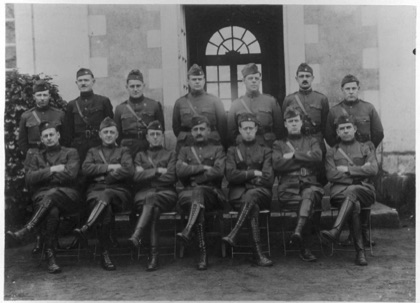
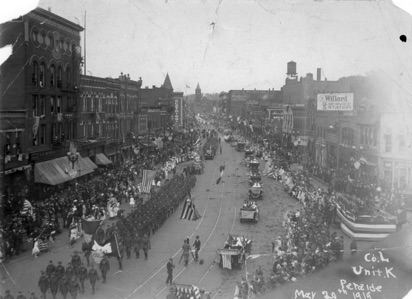
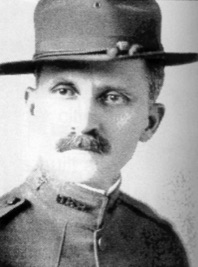
Click on arrow above to hear John Schreier, of BH Media Group, describe the formation of Unit K.
Unit K returns to Council Bluffs following World War I, May 1919
The doctors of Unit K, Mobile Hospital #1.
Click on arrow above to hear John Schreier, of BH Media Group, describe how battlefield injuries changed in World War I.
Dr. Donald MaCrae, Jr.
Some of the battles served by Unit K...
The Battle of Belleau Wood
June 1-26, 1918
Took place during the German spring offensive. German commanders ordered an advance on Marigny and Lucy through Belleau Wood.
1811 killed, 7966 wounded
Battle of Sait-Mikiel
September 12-15, 1918
Involved the American Expiditionary Force and 48000 French troops under the command of General John J. Pershing in a plan to break through German lines and capture the city of Metz. The United States Army Air Service played a significant role.
7000 casualties.
Battle of Chateau-Thierry
July 18, 1918
One of the first actions of the American Expeditionary Forces under General John J. Pershing.
Battle of Meuse-Argonne
September 26 - the Armistice November 11, 1918Part of the final Allide offensive of World War I that stretched the entire Western front.
26,277 killed
95,786 wounded
Though the Army and Surgeon General endorsed the mobile hospital concept,
there was no money in the budget to fund it.
After organizing the outfit Dr. Macrae raised money by soliciting donations of cash and goods from towns and individuals throughout southwest Iowa. Mrs. Macrae was equally as patriotic and spirited; she had a platform set up on her lawn and hired an orchestra to perform weekly concerts. When people showed up to enjoy the free music she passed the hat for donations. Mrs. Macrae sold her car and discharged her servants for extra money to buy supplies and organized K Club, an organization tasked with creating ways to support Unit K. Volunteers met regularly at the library to roll bandages and knit clothing for the unit.